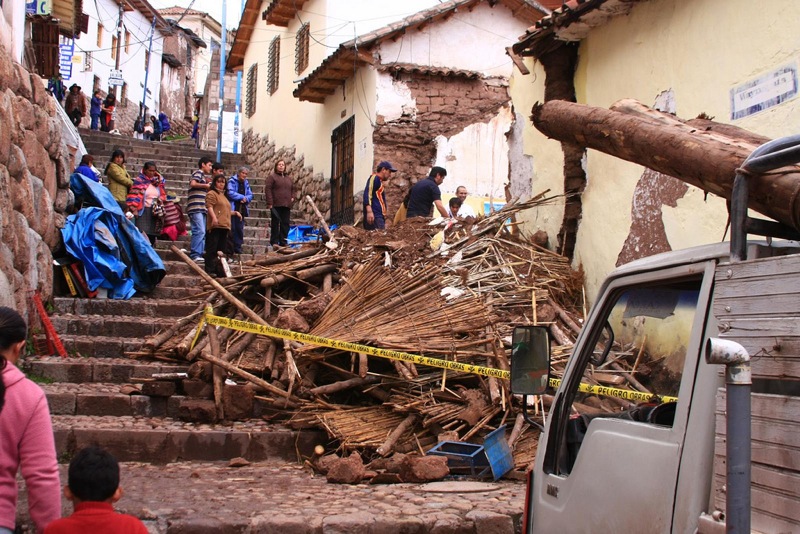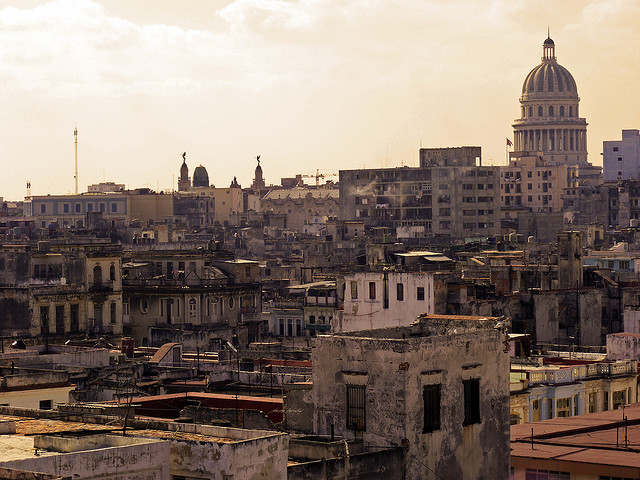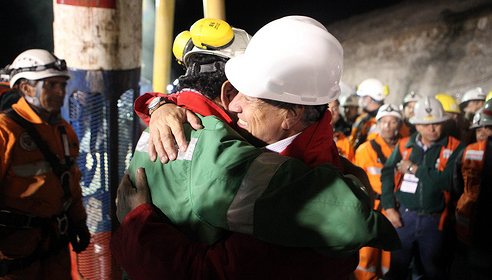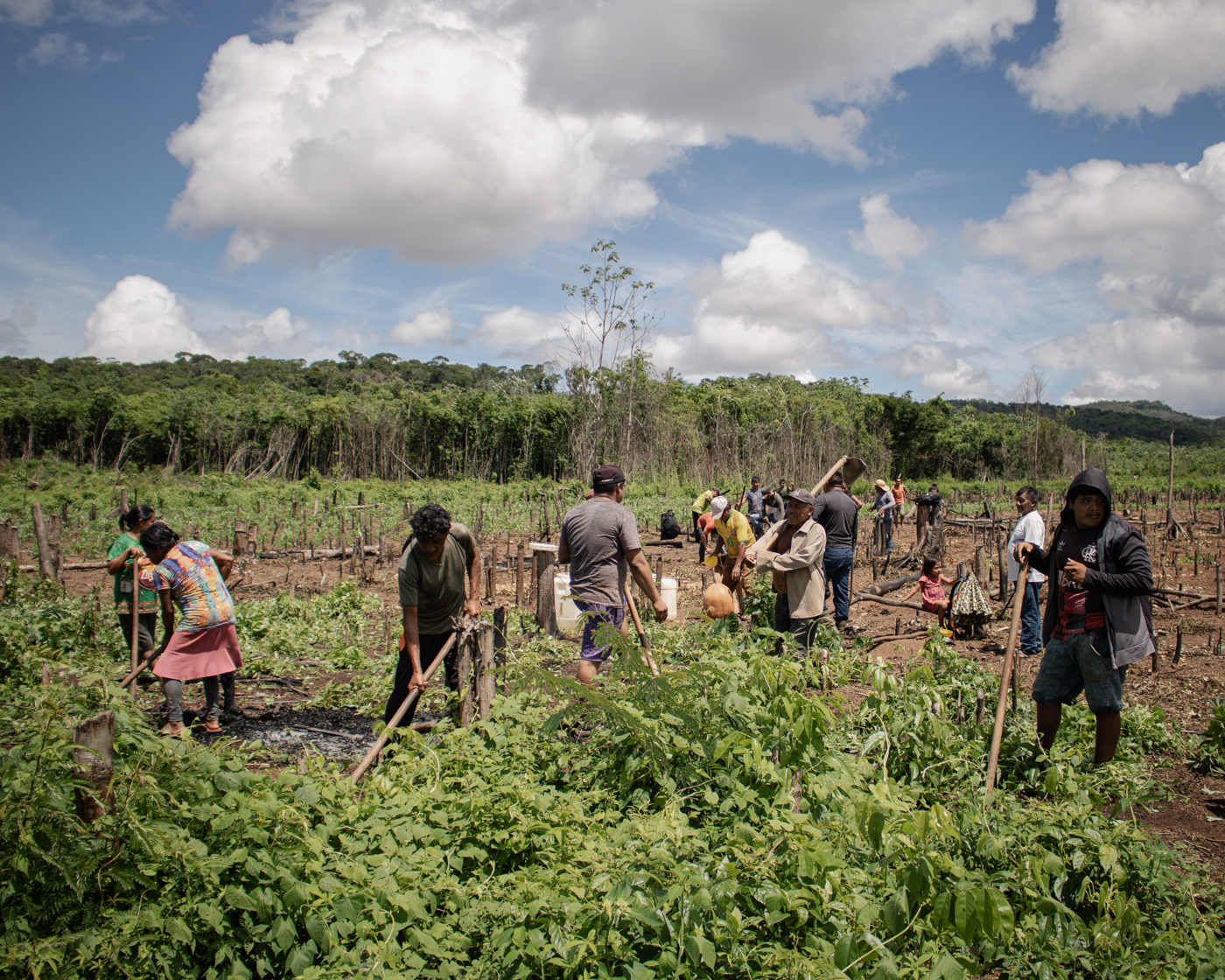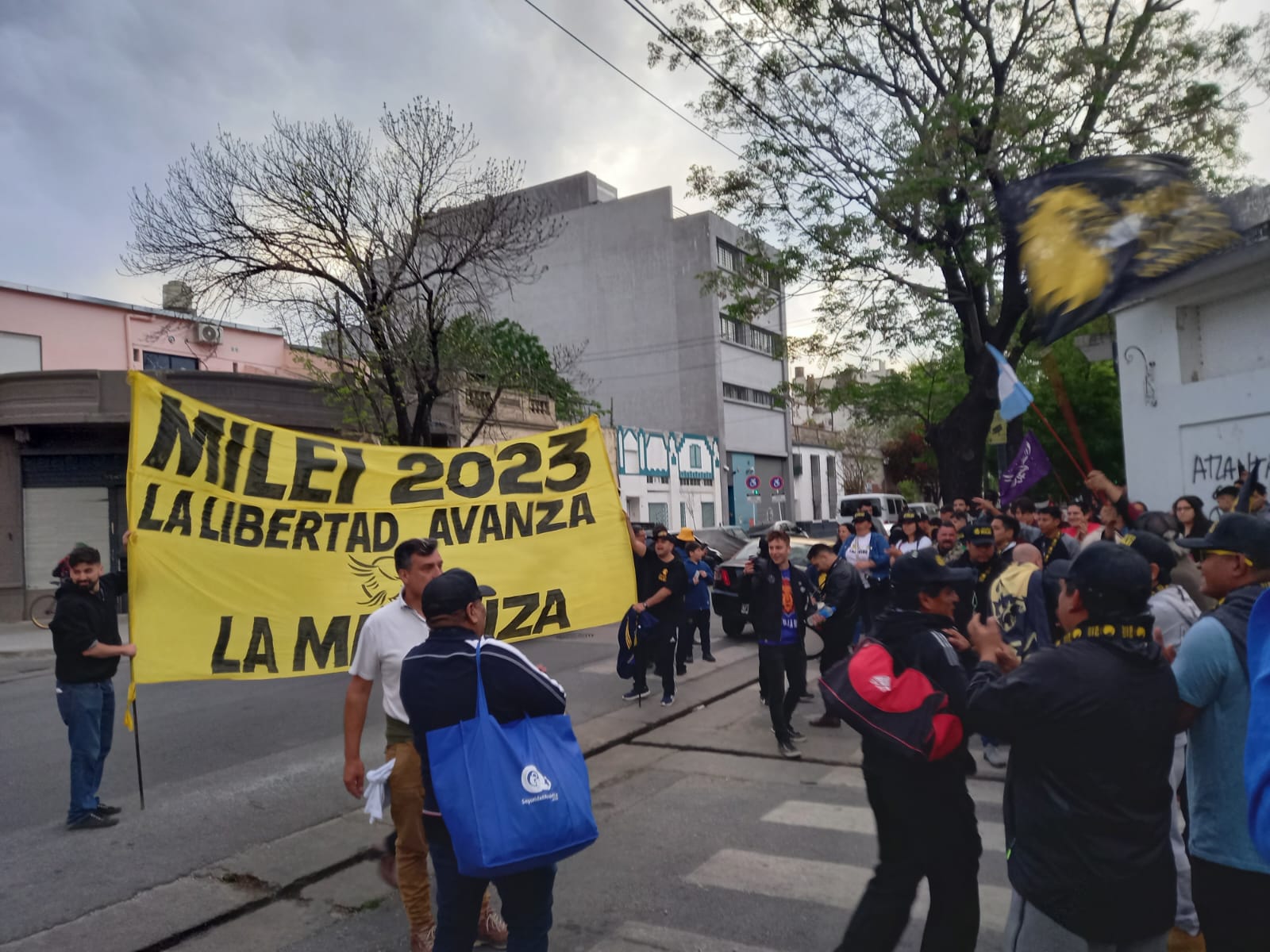
Argentina, Dispatches, Regions, Southern Cone
It Takes Three to Tango: Argentina at a crossroads as 2023 elections near
October 20, 2023 By Pablo Martínez-Sistac
A century ago when legendary tango singer Carlos Gardel walked the streets of Buenos Aires, he assured Argentinians in his song “Volver” that 20 years is nothing. Today, they are loath to accept that kind of rosy thinking.
At the time of writing inflation is at 138%, foreign debt is USD 40 billion and the poverty rate is 43%. On October 22 Argentinians are set to elect a new president, perhaps after a second-round vote. I spent 10 days in Argentina before the elections talking with a voter of each candidate to understand what is at stake.
Background
Argentine politics have been dominated by the House of Kirchner since they first came into power in 2003, under the helm of president Nestor Kirchner. He inherited an economy in crisis, set off by a spate of external shocks — drop in prices of agricultural commodities, a recession in neighboring Brazil, appreciation of the dollar. By year end 2002 the economy had contracted 20% since 1998.
The Kirchners and their allies have occupied the Pink House on four occasions. Once with Nestor, twice with his now-widowed and current vice-president Cristina, and once more with sitting president Alberto Fernandez. The stream was only interrupted in 2015 with center-right Mauricio Macri, who failed to get re-elected losing to Fernandez. The game of power in Argentina has become a clash between the kirchneristas and, well, anyone else.
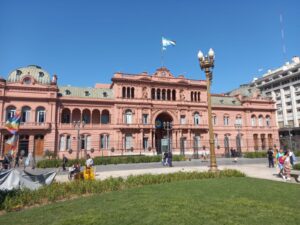
The Pink House, seat of executive power in Argentina (Pablo Martínez-Sistac / Latin America News Dispatch)
For this election the kirchneristas — a left-wing split from the broader Peronist movement — have propped up current economy minister Sergio Massa to replace Fernandez. The opposition, however, is divided. On the one hand, Patricia Bullrich is carrying the baton for Mauricio Macri’s coalition.
On the other hand, the outsider and eccentric libertarian economist Javier Milei is fighting the traditional politicians. His promise of radical reforms which include a full dollarization has resonated well with citizens. He is now consistently polling in first place.
Massa offers continuity of affairs, while Bullrich offers change. Milei on the other hand offers a complete upheaval of the status quo, a popular idea among Argentinians who have not witnessed the soft landing of the country’s economy the House of Kirchner might have preferred.
Achilli’s Heel: A loyal kirchnerista’s business woes
Diego Achilli, 42, is the owner of a chain of ice cream parlors and a kirchnerista councilman for the town of Tres de Febrero, right outside Buenos Aires. Despite being a politician himself and working in the Massa campaign, I did not get the sense he is blinded by ideology. Overall, his profile reveals issues and serious concerns the media mostly ignores about the voters and movement behind Massa.
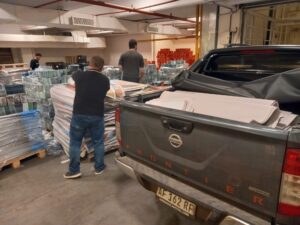
Achilli, left foreground, loads up his truck with posters and flyers in the Massa campaign HQ. (Pablo Martínez-Sistac / Latin America News Dispatch)
“Massa is a technocrat”, he asserts right off the bat. “His tenure as mayor of the town of Tigre and his work as head of the Social Security Administration prove he is a competent administrator. The party just needs to let him be.”
The claim that Massa is an infiltrator posing as a kirchnerista is not an unheard of practice in the Peronist movement. Would-be Peronists have perfected the bait-and-switch, riding the coattails of the leviathan political movement as a means to the office. President Fernandez did not consider himself a leftist until he joined the Kirchner wing and ascended to the presidency. Notably, President Menem (1989-1999) called himself a leftist and then became one of the leading figures of the neoliberal era.
Achilli is owner of “The Loves,” an ice cream shop founded by his Italian grandparents. He and his father expanded the business into a franchise model with 120 shops.
He says he experienced trouble along the way. The Chamber of Commerce refused to help him expand. Established business owners saw newcomers as a threat and wanted to keep their cozy status.
“The tax cuts during neoliberal administrations would leave smaller and purely local business owners to deal with fees and regulations that larger businesses and multinationals could completely evade,” he explains. “This was repeated during the Macri government.”
According to Achilli, small businesses’ problems created clogged supply chains since they were traditionally the distributors to the countryside and small towns. On the government side, the bureaucracy prioritized larger businesses and multinationals which made it nearly impossible to get industrial appliances and raw materials such as cocoa or vanilla extract.
“No one wanted to help us. Government agencies would pick up the phone and tell us there was nothing that could be done,” he says. “It was as if they didn’t want us to work.”

In the crucial final days of the campaign, Diego can’t go more than a few minutes without checking his phone and reply to a text or take a call. (Pablo Martínez-Sistac / Latin America News Dispatch)
For Achilli, the biggest difference between Massa and the other two candidates is Massa’s idea of the economy, which focuses on production. The neoliberal policies of the Macri government ruined small manufacturers, he says.
“Cheap imports destroyed national industries, making unemployment rise,” he says. “We just wanted to be allowed to work.”
Used to these kinds of comments, Achilli doesn’t slur his words. Even when explaining macroeconomic concepts he doesn’t need fillers to get his thoughts across. Small hand gestures rhythmically illustrate every point and a friendly smile ends every phrase. Almost as if he were a politician in a constant state of campaigning.
The power of rhetoric comes easy to Achilli, who is a host on his own radio talk show, “Work Culture.” Every Tuesday Achilli and his wife Roxana sit down with small business owners or entrepreneurs to have them share the way they started and have managed their business.
And the show serves a political purpose, too. Its motif consists of telling listeners that under the Macri government things were worse than now and Argentina cannot go in that direction again. Guests come from different fields and amplify the message by adding their personal examples.
“With Macri almost 24 thousand small businesses closed. Under Fernandez it was 12 thousand. Half of those in the Macri years. That tells you what you need to know about who really cares about the working class,” he says.
Spreading his belief that everyone should be encouraged to work and grow is Diego’s life mission. Inspired by his immigrant grandparents and his show guests this summer he published the book “Work Culture in the New Age of Innovation.” It reads like a manifesto — blending an economic history of Argentina that focuses on factors like industrialization and mass immigration, with his views on the relationship between labor practices and sustainable development initiatives that have become dominant in the present era.
The Breaking Point: Hope and faith is all Nancy has
Gone are the days when the “Paris of South America” was a vibrant hub of commerce where stability and prosperity were guaranteed.
“It is a monthly struggle to make ends meet”, says Nancy Castellanos, 37, a public school teacher from La Matanza on the outskirts of Buenos Aires. She intends to vote for Javier Milei.
In a country used to bankruns and defaults on its debt, the “pocket issue” is a strong factor when choosing a candidate. “El peluca” (The Wig), as Milei is called for his flamboyant hair, has promised to bring inflation under control by shutting down the central bank and dollarizing the economy. In a country where money is worth less everyday, many are used to saving in dollars and a huge black market of currency exchange has grown.
“Milei is the only candidate with a plan that can create any form of economic stability,” says Castellanos.
She is convinced that the working class has the most to gain from a Milei government since a well-paying job and a pension are practically unreachable for them in the current economy. A high number of steep taxes and regulations make hiring very difficult for large and small businesses. For 2023 the Heritage Foundation’s Economic Freedom Index lists Argentina at place #144, above Belarus, but under Uganda.
Therefore informal labor has become a common practice. This involves hiring employees with an “oral contract” where people get paid in cash or via bank transfer. Employers and employees pay no social security, pensions or taxes under this scheme. A few of Nancy’s siblings (she is the 8th of a whopping 10) run a small fast food place where all staff are informal hires.
“They are not making pension payments but at least they make money. For people with no degrees finding a job is so difficult that their options are either to work informally or to turn to crime,” she says.

As a teacher, Nancy Castellanos thinks about the future often. (Pablo Martínez-Sistac / Latin America News Dispatch)
A devout evangelical, Castellanos also particularly agrees with Milei’s strong pro-life stance. The current administration passed an abortion law which allows for pregnancy interruption up to the 14th week. A conservative backlash could provide an extra push for the libertarian candidate.
Even so, the economy and a pro-life stance are the only views she shares with Milei. Having little to agree with but just enough to vote for him is a trend common for those backing the libertarian.
Castellanos is one of the people who are not hardcore Milei supporters but rather part of an amalgamation of libertarians, conservatives, independents, reformists, and pretty much anyone who feels alienated by the last 20 years of politicians.
Milei has vowed to fight what he calls the “political caste”: career politicians from traditional parties who only care about their benefits and not the public interest. Many see this as a direct copy and paste of Donald Trump’s crusade against “the swamp.”
“Milei is not just a lesser evil but also the renovation of Argentinean politics,” she says.
Also polling high for Milei are first time voters. Team Milei has employed an intensive social media campaign where his Instagram reels, TikToks and best moments compilations are the biggest magnet for likes and shares among the youth. The flashy rockstar personna of wild hair, insults and constant yelling has made politics more entertaining than the usual dryness coming from political veterans like Massa or Bullrich. Despite this image of “wild and free” being popular with Gen Zers, it could not be more far apart from the concerned and serious profile of middle aged Argentineans like Castellanos.
Castellanos is worried the lack of a clear identity in Milei’s movement could be a problem down the road. Especially when the time to act comes and no one can agree on how to proceed.
“A lot of people think his promises are just for show including me,” she confesses. “Things like privatization of all government entities, closing down 11 ministries or even the school voucher system are easier said than done,” she says.
Castellanos continues, explaining that all the movements, small parties and politicians suddenly supporting Milei will ask for something in return later on.
“Imagine if Milei can’t win the first round and has to cater to the moderate voters of Bullrich, if not flat out ask her to endorse him,” she says. Her eyes widen. “Then all legislation would have to be smoothed out and watered down by the coalition in order to be approved.”
A former public speaking instructor at a modeling academy, Castellanos dislikes Milei’s character. His persona of volatile professor with a chainsaw is usually accompanied by quoting papers and libertarian economic theory that lose the public.
“Despite his theatrics, when it’s time to explain how he will get things done he breaks into complex monologues as if he were still a professor. Like he did in the debate when even the other candidates were confused,” she says.
The concerns of a tight race don’t stop merely at the political risks of maintaining a broad coalition or the lack of clarity in messages. The ghost of election fraud made Castellanos volunteer to be an overseer for Milei’s party, Liberty Advances, at her polling place to ensure all ballots are properly counted.
When asked about her worst case scenario of an eventual Milei defeat, Castellanos reveals with sadness that she plans on moving to Spain to try and get a job in radio. She would join the thousands of Argentineans that have already left for Miami or Madrid in search of better futures.
“I think we are at a breaking point. Hope and faith is all I have,” she says.
Marcelo against impunity
Marcelo Donato, 55, owns a healthcare insurance network. His muscles are robust, he’s tattooed and he loves riding motorcycles (an unexpected look for someone in his profession, I admit.) He looks more like the kind to go for the libertarian firebrand Milei. And he initially supported him.
Donato changed camps after it was known that Milei held meetings with corrupt union leaders and that in some provinces low-level bureaucrats affiliated with Massa helped out Milei’s campaign as a way to protect their jobs in an eventual regime change.
Come October 22, Donato assures me he is casting his vote for Bullrich.
His deciding factor was the lack of scandals surrounding Bullrich. Scandals are the bread and butter in Argentinean headlines. Donato explains that just a few days ago, Martin Insaurralde, the kirchnerista chief of staff for the Governor of Buenos Aires was seen partying with cocaine in a yacht.
“They live like sultans. And nothing will happen to him,” he says. “Because nothing ever happens to them.”
Donato thinks impunity is the biggest problem in Argentinean politics. He especially cannot stand it when the Kirchneristas are in the middle of the drama. “The biggest filth in Argentina is kirchnerismo”, he says.
He lists multiple scandals of the Kirchner family with millions of dollars found in bank accounts, cozy government contracts for their allies and the mysterious ease with which they usually get off the hook.
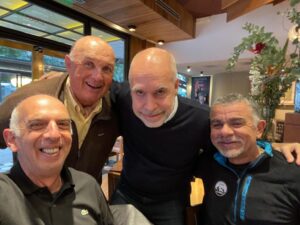
Donato (right) often runs into Bullrich’s potential Chief of Staff and current Buenos Aires mayor Jorge Larreta (center) at the local coffee shop. (Pablo Martínez-Sistac / Latin America News Dispatch)
As a business owner, Donato pays special attention to candidates’ economic programs. He always thought Milei’s plans were too far-fetched and mostly sensationalist rhetoric to get voters.
“A complete dollarization is impossible and the shock for government spending in pensions, healthcare and education would be too strong for these sectors to sustain,” he says.
Donato prefers what he sees as the gradual approach of the Bullrich plan. Like most former Macri voters, Donato thinks when Macri failed to get re-elected his plans were all ended prematurely by the current administration. He thinks that a step-by-step plan is most capable of long-term solutions.
“The Bullrich plan works by carefully rolling back the failed policies of high-taxes and regulations. This is more sensible to the reactions different sectors may have which makes it easier to adapt,” he says.
Although an advocate of the stability the Bullrich approach supposes, he gets teary eyed when explaining the difficult situation faced by retirees who struggle with average monthly pensions equivalent to $150.
Originally from Necochea, a port city five hours away from Buenos Aires, and constantly on the move for work, Marcelo knows that the countryside looks very different from the calm feel of life in the capital.
“Five out of ten people are below the poverty line,” he cites from his phone. “People just can’t make ends meet and we know these politicians are stealing everything. If they stole only half of what they steal this would be a decent country,” he emphatically added before laughing.
Argentina was historically an agricultural powerhouse. Nicknamed “The World’s Silo,” its vast acres of soy and corn fields were decisive in supplying the world with grain. Stock market traders would even speculate in price futures looking at numbers such as crop yields and subsidies. Nowadays, taxes for both imports and exports and regulations such as currency controls have completely broken with these profitable practices.
Touching on the subject of public safety, Donato actually sees Milei as fit for the job. With theft and burglaries becoming more common in Argentina, many welcome the iron fist approach flaunted by Milei’s vice presidential ticket, Victoria Villarruel. Her ties to the military and her positive comments regarding the repressive dictatorship from 1977-1983 have gained her parallels with Salvadoran president Nayib Bukele whom she calls an “inspiration.”
Donato claims despite shady politicking and underhanded electioneering Milei will win in either the first or second round. “But he will win,” he says.
Regardless of his confidence in predicting the future, Marcelo will still vote for Bullrich because he hates politicians getting away with their “filth.”

Although living a comfortable lifestyle, Marcelo wants a modest and respectful government. (Pablo Martínez-Sistac / Latin America News Dispatch)
The Outsider on the Inside: Colombian ambassador to Argentina
Ambassador Camilo Romero, 47, is a former governor and senator. He was appointed to Buenos Aires a year ago and spends his days talking to trade officials, meeting with other diplomats, and trying to make time for watching soccer, his passion.
He began our short chat by reminding me that diplomatic protocol dictates he cannot interfere in domestic affairs. This does not stop him from offering his reflections from his first year on the job. Romero assures me that despite the delicate situation of the country there is a lot to learn from Argentina.
“There is no country more generous than Argentina,” he says. Rough times and all it continues to be a country of open-arms.”
Romero is referring to Argentina honoring its centuries old tradition of being a recipient of migrants. Since the 1970’s South Americans have moved to Argentina drawn by its relative peace in a convoluted region.
“Look at all the Venezuelans who came here,” he says. “Fleeing a crisis and in the middle of a pandemic Argentina still took them in.”
Romero explains that migrants in Argentina are guaranteed a number of rights by law that denote an “commendable immigration policy”.
“For example they receive a basic income to help them settle and after two years of residence they can apply for citizenship,” he says. “Not many countries in Argentina’s situation would continue to do that.”
Another reason people move to Argentina is because of the esteemed reputation of health sector education. Peruvians, Ecuadoreans, and Bolivians have packed the faculties of medicine, nursing and dentistry for decades.
“But also Colombians,” says Romero. “Sixty percent of the roughly 120 thousand Colombian citizens registered at our consulate are students. When over half of the foreigners from a given country are students it says a lot about education in their country of residence”.
Regarding the election Romero explains that inside an embassy they can only wait for the new administration and then go over the bilateral policy goals to see “what goes, what doesn’t, and what’s new.”
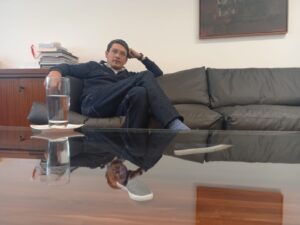
Ambassador Romero is laid back. He says the election is business as usual. (Pablo Martínez-Sistac / Latin America News Dispatch)
Romero finishes our talk by offering food for thought about the state of affairs in Latin America.
“Latin Americans should think not about our differences but about all of the opportunities that remain unexplored. We have the Amazon rainforest, crucial natural resources, and above all, we are a huge region with a lot of people willing to work together,” he says.
The Road Ahead
October 22 has the potential to be remembered. Will the candidate that wins the election be able to heal Argentina’s economic ills?
Bullrich and Co. are aiming for a repeat of the 2019 election with her Macristas facing off Massa’s Kirchneristas. Milei is making his own way by representing everyone else and claiming messianic status. The candidates and their voters seem to only be joined in their dislike for each other.
More than anything, the Argentinean election seems to be about imposing a way of seeing and living the world — an approach befitting a country which people perceive to be in crisis.
Be that as it may, voters are firm in their convictions and have a clean conscience about why they vote for whom they vote. For people like Diego, Nancy and Marcelo, there is an awful lot to fight for in Argentina.
About Pablo Martínez-Sistac
Pablo Martínez -Sistac is a public relations officer and freelance journalist from Cartagena, Colombia. His interests are Latin American elections and security issues. He holds a B.A. in political science and communications from Adelphi University in New York.
